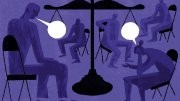Kay Redfield Jamison--author, professor, and respected scientist--came to Harvard in October and told a Sanders Theatre audience that in college she thought obsessively about killing herself, and it never occurred to her that she was ill. When she was suffering herself, she said, she "would have loved to know that there are others out there, and that they had come out through the other side."
Jamison is the best-selling author of An Unquiet Mind and Night Falls Fast. She was introduced by University provost Harvey V. Fineberg, former dean of the School of Public Health, as the kickoff speaker in a weeklong series of events: part of an "effort started two years ago to help Harvard deal with issues of emotional health and mental disturbance in our community." The student health coordinating board (formed at the recommendation of a critical 1999 report on Harvard's mental-health services--see "Mental Health Services Examined," March-April 2000, page 73) has since sponsored more than 40 different programs.
Jamison began by noting that more people with mental problems reach college these days because medications have helped them function. Depression is common, she warned: "In their lifetimes, nearly 1 in 5 people will have a major depressive episode" and "despite the fact that it is very treatable, suicide is the second leading cause of death in college students." She called Harvard's efforts "thoughtful, critical, and honest," even as she explained how difficult recognizing and treating mental illness can be. In response to a question from the audience about what to do if a friend won't seek help, Jamison acknowledged that the toughest challenge is getting people into treatment and getting them to stay with medication.
A crowd of 700 heard Jamison speak, and hundreds more students, faculty, and staff members from across the University attended workshops on student mental health in the ensuing week. Assistant provost Marsha Semuels provided student-run outreach initiatives in the Houses with ice cream and door prizes, including relaxation CDs and gift certificates for a massage or dinner at a local restaurant. House members themselves chose the topics. Workshops that put issues in a positive light, such as those focusing on sleep, relationships, and success, generated the most interest. Seventy students showed up for Mather House's "Success 101: Healthy and Happy at Harvard and Beyond."
In addition, every teacher at Harvard, from senior faculty members to lecturers, was sent a brochure--titled "What can I do?"--detailing how to help students in distress, from identifying warning signs, to engaging students, to making referrals.
The outreach was Harvard's first-ever University-wide effort on an issue of mental health. For many staff participants, even those in the healthcare professions, the week marked the first time they had come together to focus on Harvard undergraduate and graduate students. Even some computer-support specialists attended the workshops, since they often find themselves on the line when a frustrated student breaks down over the loss of a paper or a hard-disk failure. Like many Harvard employees, says Semuels, they "are eager to do what they can to help" students in distress.





